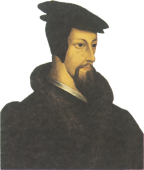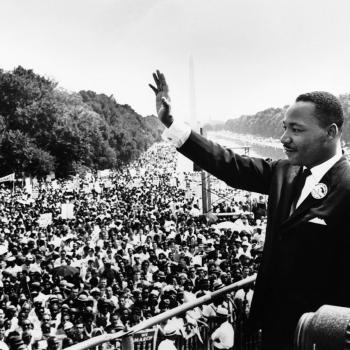By Rakesh Peter Dass - June 1, 2009
"A robust employment of reason, commitment to order and unity, abhorrence of disorder, understanding of anxiety as a lack of faith in God's care, and belief in an innate religious instinct characterize Calvin's theology."
 John Calvin, (1509-1564) was born July 10 in Noyon, a small church town in Picardy, France. After studying for the priesthood at the University of Paris, Calvin studied law from 1528 to 1533 and obtained a Licence in law. Calvin fled to Basle, Switzerland in 1535 to avoid the persecution in France of Reformation sympathizers like him. Here, he published the first (Latin) version of his most well known work, The Institutes of Christian Religion. He moved to Geneva in July 1536 and then to Strasbourg in 1538, where he expanded the Latin Institutes and translated it into French. Calvin returned to Geneva in September 1541 and established a theocratic rule in the city. In 1559, Calvin established the Genevan Academy to train Reformation, and French, pastors. He married Idelette de Bure in August 1540. Calvin died on May 27, 1564 in Geneva.
John Calvin, (1509-1564) was born July 10 in Noyon, a small church town in Picardy, France. After studying for the priesthood at the University of Paris, Calvin studied law from 1528 to 1533 and obtained a Licence in law. Calvin fled to Basle, Switzerland in 1535 to avoid the persecution in France of Reformation sympathizers like him. Here, he published the first (Latin) version of his most well known work, The Institutes of Christian Religion. He moved to Geneva in July 1536 and then to Strasbourg in 1538, where he expanded the Latin Institutes and translated it into French. Calvin returned to Geneva in September 1541 and established a theocratic rule in the city. In 1559, Calvin established the Genevan Academy to train Reformation, and French, pastors. He married Idelette de Bure in August 1540. Calvin died on May 27, 1564 in Geneva.
Evangelical humanism (that emphasized the Gospel over the Law) and lived spirituality (that desired a moral life) influenced Calvin and motivated his turn to scripture, rational theology, and the belief that contemporary church and society should imitate the earliest church. A robust employment of reason, commitment to order and unity, abhorrence of disorder, understanding of anxiety as a lack of faith in God's care, and belief in an innate religious instinct characterize Calvin's theology, along with the study of scriptures in their original languages and the art of persuasion (rhetoric).
Calvin usually equated righteousness with control and sin with unrestraint. His insistence on God's care and control of everything shaped his idea of predestination (that some are elected for salvation) and faith in God (i.e., salvation by God's grace). Calvin rejected faith without works and called those Christians "hypocrites" who did not live "justly and innocently" and cheerfully aid the needy. Despite his attempts to humanize theology, Calvin repudiated any thought system, philosophy, or religious idea that claimed to penetrate the ultimate mysteries of God.
Harmony, for Calvin, meant the mind's control of lower faculties, cities' control by rulers, women's control by men, and children's control by their parents. Secular rulers played a positive role in the God-ordained scheme of things. Calvin considered the church a localized and functioning community and affirmed its role in moral education. In Calvin, we find a concern for order along with the limits of systems, the elevation of religion over society and belief in the divine purpose of government, and the use of reason and scripture with an insistence on "mystery." These diverse views may explain why his readers continue to find him in agreement with varied liberal, evangelical, and hierarchical views.
Calvin has influenced political, economic, and social ideas globally, especially in the West. Calvin's nature-grace model, that the law is given within the framework of grace, influenced the belief in Justice, that right not might is the basis of political order, and the belief in Liberty, that human consent, not force, is the basis of true government.
In the economic realm, he has affected our notions of charity. Though many people have received Calvin through Max Weber, who considered property a "bundle of rights," Calvin thought of property as a duty rather than a right and emphasized the social obligation of the wealthy. In the social arena, modern ideals like mutual responsibility and the commitment to justice echo Calvin's focus on a moral and responsible life. Within Christianity, Calvin's work has led to the birth of Reformed and Presbyterian churches and he has been linked, accurately or inaccurately, to legalism, moralism, dogmatic rigor, and more recently to "New Calvinism" (see this Time magazine piece.)
Read about another Featured Theologian - Martin Luther
1/1/2000 5:00:00 AM




